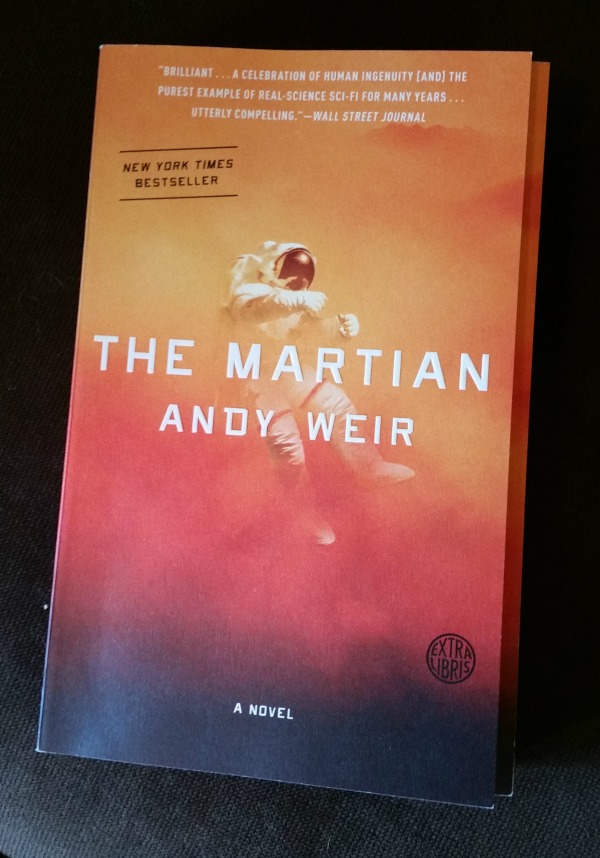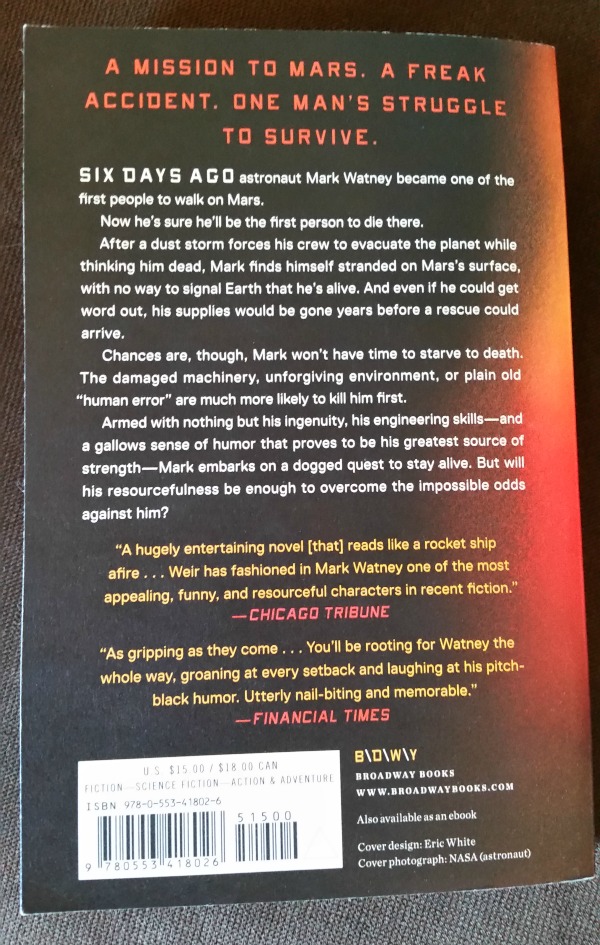Book Review: The Martian
The Martian was written by Andy Weir and published in 2014 by Crown Publishing. Six astronauts landed on Mars to complete the Ares 3 mission, but after only a handful of days, when a dust storm threatened the integrity of their evacuation craft, NASA ordered a full abort. In the ensuing chaos, Mark Watney (botanist, engineer, and all-around wise-ass) was separated from the rest of the team, presumed dead, and left behind. Unbeknownst to the rest of the Ares 3 mission, Mark has just awoken on the surface, injured, scared, but desperate to survive. I don’t think I’m spoiling anything by saying that NASA eventually realizes Mark is alive, and The Martian is the story about good old fashioned human ingenuity in the face of overwhelming odds. Oh, and there’s some pretty badass chemistry, botany, and physics thrown into the mix.
I’m a scientist, so I think science can be badass. Deal with it.
Even though I’d heard great things about The Martian from other sources, my schedule had kept me busy enough that I really only had time for audiobooks while driving or running. Sitting down and reading a book seemed like a luxury. Besides, I had tons of other books I hadn’t yet read, why should I go out and buy a new one? But when my father-in-law recommended this as one of the best hard science fiction novels in recent history, I knew I needed to move it to the top of the list. I picked it up immediately and read it on a business trip to New York City the following week.
Let me be clear: when I say “hard science fiction,” I am using the following definition from Wikipedia:
Hard science fiction is a category of science fiction characterized by an emphasis on scientific accuracy or technical detail, or on both. The term was first used in print in 1957 by P. Schuyler Miller in a review of John W. Campbell, Jr.’s Islands of Space in Astounding Science Fiction.
The Martian is a pretty short book for a genre that regularly exceeds 800 pages and 350,000 words, and as a result, I read the first half on the plane ride out to New York, and the rest the next day while trying to transition into night shift drilling. I am a pretty fast reader, but this was a seriously well-paced book that emotionally dragged me from scene to scene, desperate to know what happened. The chapters are short, giving you plenty of times to take a break and step away when you need a breather. Additionally, there is always something going on. Mark is actively working in every chapter of the book, even if it is laying out “the math,” as he so often calls it.
The Martian has three distinct literary voices interspersed throughout the book. The first, and most common, is the voice of Mark Watney. Told in the first person, Mark tells the reader what he is doing to preserve his life in the form of an ongoing mission log. His has a dry, gallows humor that makes him instantly likeable. In the face of his horribly traumatic, and most likely life-ending situation, Mark chooses to laugh at his fortune and find ways to poke fun at life in a way that drives him toward his goals instead of wallowing in his misfortune. Mark is just about the most active protagonist a reader could ever wish for, even when he’s making mistakes and almost getting himself killed.
The second voice is that of NASA in their efforts to save Mark. These chapters of the book are told in third person and follow a handful of characters including the Ares crew, mission control, and even a satellite imagery technician. These chapters feel more heartfelt and emotional than those told by Mark in his mission log. Where Mark is succinctly telling the reader what he has done to further improve his survival chances and what he plans to do the next day, or how it went, the NASA chapters feel like most traditional novels. The clinical nature of Mark’s log contrasts well these emotional moments, making them much more intense. There are some truly heartbreaking chapters in there, and Andy Weir is expertly plucking at the reader’s heartstrings.
Finally, a third person omniscient point of view shows up occasionally to foreshadow events that take place periodically through the story. Thankfully, there are only three of these that I remember, but I have to say that I liked these the least. Given the intimate nature of the other chapters in the book, having a third-person omniscient chapter thrown in suddenly for the first time in the middle of the book was jarring and, in my opinion, could have been more carefully interwoven into the story. I try not to be critical of other peoples work when I can’t provide anything constructive, so I’m just going to say that these chapters didn’t resonate as strongly with me as the others, and leave it at that.
The Martian is a masterful debut novel. In fact, it is so well written that I didn’t realize it had been initially self-published in 2011 and later picked up by Crown Publishing for re-print in 2014. Andy Weir knows his craft and I look forward to reading his next work. If you haven’t read this yet, and you’re a fan of science fiction, then I cannot recommend The Martian enough!


